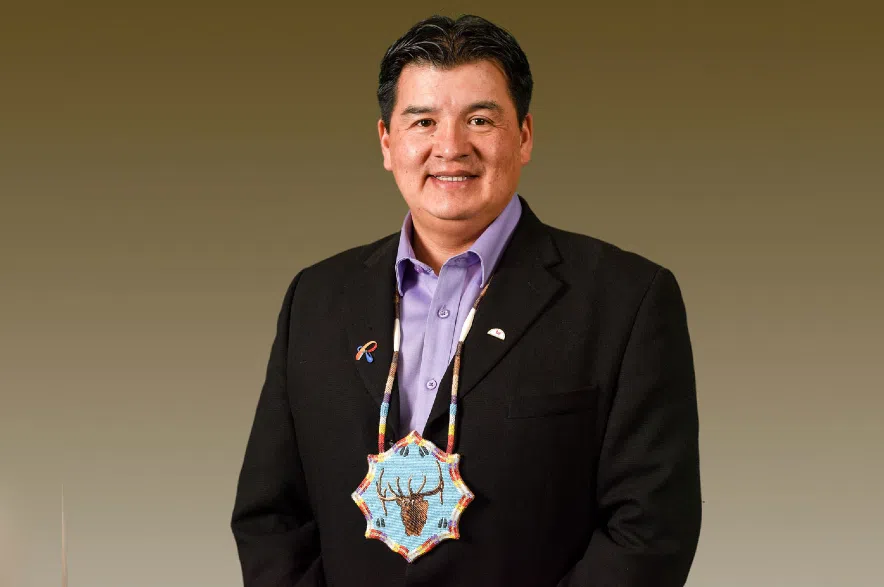Federation of Sovereign Indigenous Nations Chief Bobby Cameron said he wants Rhonda Blackmore to stay as the commanding officer of the Saskatchewan RCMP.
Assistant Commissioner Rhonda Blackmore was removed from her position as the commanding officer of the Saskatchewan RCMP following anonymous complaints.
“Everything I have done in my career, and in the last four plus years as the Commanding Officer of ‘F’ Division has been done with integrity and in an effort to demonstrate accountability and transparency,” Blackmore wrote in a letter to RCMP employees in early June.
The FSIN released a media release in support of Blackmore, where it explained it wants answers as to why she was removed.
Cameron spoke with the Evan Bray Show on Wednesday morning about Blackmore’s removal.
Listen to the full interview:
The following transcript has been edited for length and clarity.
Evan Bray: Why was this important for FSIN to put this release out on Assistant Commissioner Rhonda Blackmore?
Chief Bobby Cameron: I’ve been thinking for quite some time, since we got the terrible news. We were sad, and we were frustrated. We were outraged. We were in shock. We couldn’t believe it.
Why, during this time when things were going so smoothly? Sure, there are bumps and challenges, but this lady did her absolute best to work with each First Nation and any organization. Her communication skills were second to none in addressing what we are facing every single day: the devastation of the effects of alcohol and drugs and the violence and the unnecessary deaths that come with it.
I try to compare this with the Edmonton Oilers and Connor McDavid, you’re not going to trade away your best player for goodness’ sake. You’re going to keep doing your best to ensure the results keep coming, and that, at least together, we chip away at the overall crisis we’re facing every day within. We felt it was important to support her that way.
I did talk to Mike Duheme, and told him we were frustrated and upset and saddened to hear of this. We have a good understanding as to why, and when that comes out, there’ll be more to say for sure.
It’s no secret that there has been a challenging historical relationship between policing and First Nations. But what sets Rhonda Blackmore apart in your mind?
Cameron: I look at the James Smith Cree Nation tragedy there and how she got right involved with the interactions, the investigation, the meetings, and taking direction from chief and councils.
The word trust comes to mind. There’s been a lot of mistrust over the years and for the right reasons, between First Nations and some law enforcement. There are a lot of great officers out there who have heart and compassion, but to keep them all together and keep them running smoothly, that’s what Rhonda Blackmore meant. She faced it head-on.
She faced the challenge and welcomed them, although they were sensitive. She dealt with them, with us, and sat at the table, heard our concerns, and tried to come up with the best solutions. That’s why we think, I shouldn’t say think, we know that’s why she was removed, because she was working with us in addressing the racism. Because it still exists, within certain officials, the internal politics of the head of the RCMP, it’s still there.
Your media release yesterday calls for a couple of things. Can we talk about what you’re looking for in terms of the key demands from this release?
Cameron: We want answers, pretty much. We don’t want to be sidelined or shuffled over or get deflected. The answer is deflected. We want the truth. We want answers as to why. We still call for her to come back. We still want her back.
I have a couple of other quick topics before I let you go. You and your team at FSIN have been very actively involved in the wildfire situation in the north, which is hopefully moving in the right direction, and people are being returned to their communities. Just some thoughts and comments on what you saw up there and the province’s response?
Cameron: We saw complete devastation and complete chaos with such an unprecedented wildfire situation.
Imagine losing everything in your life that meant so dear to you. When you lose a family symbol, those mean the world to all those families. They lost everything you can imagine, close to 200 homes, in the community of Denare Beach, a complete total loss. We saw a lot of hurt and heartache, but we also saw a lot of determination and resiliency from First Nations and non-First Nations alike, coming together to support one another, care for one another, listen to one another and heal, because that’s what it’s going to take moving forward as to continue to heal with with one another, and we’re doing our part with the Prince Albert Grand Council and their First Nations too.
We’ve talked a lot about the after-action review that will happen, reviews of what went well, and what didn’t go well. Would you have any suggestions for the province on handling a situation like this in future years?
Cameron: Tackle these fires quicker, work with the First Nations as it’s their land. It’s our land. Before firefighters even existed, our First Nations, when they would see a fire deep, deep in the forest, they’d go tackle it at night with no equipment, just with their bare hands or bare feet, with some buckets of water, and they would put it out. Now we’re in unprecedented times with such a terrible wildfire that happened this year, so that’s what it takes, is working together with First Nations and taking their direction.











